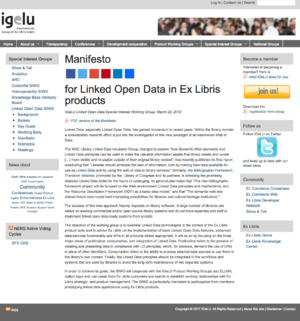2012 - Manifesto for Linked Open Data in Ex Libris Products - IGeLU Linked Open Data Special Interest Working Group
Texto
IGeLU Linked Open Data Special Interest Working Group, March 22, 2012
Linked Data, especially Linked Open Data, has gained momentum in recent years. Within the library domain a considerable research effort is put into the investigation of this new paradigm of an interwoven Web of Data.
The W3C Library Linked Data Incubator Group, charged to explore "how Semantic Web standards and Linked Data principles can be used to make the valuable information assets that library create and curate [...] more visible and re-usable outside of their original library context"1, has recently published its final report concluding that "Libraries should embrace the web of information, both by making their data available for use as Linked Data and by using the web of data in library services." Similarly, the Bibliographic Framework Transition Initiative, promoted by the Library of Congress and its partners, is stressing the promising chances Linked Data holds for the future of cataloging. Its general plan notes that "The new bibliographic framework project will be focused on the Web environment, Linked Data principles and mechanisms, and the Resource Description Framework (RDF) as a basic data model." and that "The semantic web and related linked data model hold interesting possibilities for libraries and cultural heritage institutions."2
The success of this new approach heavily depends on library software. A large number of libraries are reliant on existing commercial and/or open source library systems and do not have expertise and staff to implement linked open data ready systems from scratch. The objective of the working group is to examine Linked Data technologies in the context of the Ex Libris product suite and to advise Ex Libris on the implementation of basic Linked Open Data features, enhanced data-services functionality and APIs in all products where appropriate. It will do so by focusing on the three major areas of publication, consumption, and integration of Linked Data. Publication refers to the process of creating and presenting data in compliance with LD principles, which, for instance, demand the use of URIs in place of other identifiers. Consumption refers to the ability to process external data sources to use them in the library’s own context. Finally, the Linked Data principles should be integrated in the workflows and systems that are used by libraries to avoid the long-term maintenance of two separate systems.
In order to achieve its goals, the SIWG will cooperate with the IGeLU Product Working Groups and ELUNA, collect input and use cases from Ex Libris customers and search to establish working relationships with Ex Libris strategic- and product management. The SIWG is particularly interested in participation from members prototyping linked-data applications using Ex Libris products.
1 http://www.w3.org/2005/Incubator/lld/XGR-lld-20111025/
2 http://www.loc.gov/marc/transition/news/framework-103111.html
Archivo
Enlaces
URL: http://igelu.org/special-interests/lod/manifesto
Wayback Machine: https://web.archive.org/web/*/https://web.archive.org/web/*/http://igelu.org/special-interests/lod/manifesto
